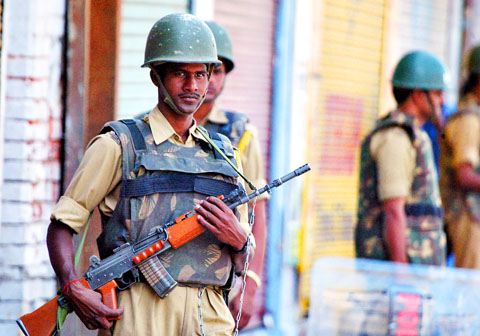Authorities imposed an indefinite curfew in Muslim-majority areas of Indian Kashmir early yesterday and thousands of security forces patrolled the Himalayan region’s main city ahead of another rally to protest Indian rule.
A general strike in Srinagar meanwhile entered a second day yesterday. Separatist leaders called for the weekend strike in Jammu-Kashmir state’s main city on Friday as part of mounting protests to demand freedom for the region.
The unrest is the worst to hit Kashmir in more than a decade and has left at least 34 people dead, mainly protesters.

PHOTO: AFP
Police drove through Muslim neighborhoods in sections of Kashmir Valley before dawn yesterday announcing the latest curfew and warning residents to stay indoors. The curfew does not apply to areas outside the valley, which have large Hindu populations and have been largely peaceful over the last two days.
“Stern action will be taken against violators,” the police warned.
No official reason has been given for the latest curfew in Kashmir, but it comes ahead of a separatist rally and sit-in planned for today in Srinagar.
“We have also called in the army to assist the police in enforcing law and order,” said Botlagauduru Srinivas, a senior police officer.
Thousands of police officers and paramilitary troops in riot gear patrolled the deserted streets of Srinagar yesterday.
Across the city, chants of “We want freedom!” could be heard from public announcement systems at mosques. The announcements also exhorted people to defy the curfew.
No violence or curfew violations were immediately reported.
A mass protest on Friday was the largest in two months of angry rallies that have rocked the Indian portion of Kashmir, pitting the region’s Muslim majority against the Hindu minority. An estimated 275,000 people thronged a main square in Srinagar for the rally called by a coalition of separatist political parties.
The crisis began in June when Muslims demonstrated over a government decision to transfer land to a Hindu shrine, saying it was actually a settlement plan meant to alter the religious balance in the region. After the plan was rescinded, Hindus took to the streets of Jammu, a predominantly Hindu city, demanding it be restored.
On Saturday police had to fire tear gas and use bamboo batons to disperse groups of Hindus and Muslims who defied a curfew and clashed in Poonch, a town 270km northwest of Jammu, senior police official K. Rajendra said. The curfew was imposed in Poonch after violence there early on Saturday.
At least 31 people, including 13 policemen, were injured in Saturday’s clashes, Rajendra said. The curfew in the town continued yesterday but there were no immediate reports of any fresh violence.
There is a long history of separatist movements in Kashmir, which has been divided between India and Pakistan since 1948. Most were peaceful until 1989, when a bloody Islamic insurgency began. The insurgents want to see India’s part of the region merged with Pakistan or given independence.
At least 68,000 people have been killed in the fighting.

VAGUE: The criteria of the amnesty remain unclear, but it would cover political violence from 1999 to today, and those convicted of murder or drug trafficking would not qualify Venezuelan Acting President Delcy Rodriguez on Friday announced an amnesty bill that could lead to the release of hundreds of prisoners, including opposition leaders, journalists and human rights activists detained for political reasons. The measure had long been sought by the US-backed opposition. It is the latest concession Rodriguez has made since taking the reins of the country on Jan. 3 after the brazen seizure of then-Venezuelan president Nicolas Maduro. Rodriguez told a gathering of justices, magistrates, ministers, military brass and other government leaders that the ruling party-controlled Venezuelan National Assembly would take up the bill with urgency. Rodriguez also announced the shutdown

Civil society leaders and members of a left-wing coalition yesterday filed impeachment complaints against Philippine Vice President Sara Duterte, restarting a process sidelined by the Supreme Court last year. Both cases accuse Duterte of misusing public funds during her term as education secretary, while one revives allegations that she threatened to assassinate former ally Philippine President Ferdinand Marcos Jr. The filings come on the same day that a committee in the House of Representatives was to begin hearings into impeachment complaints against Marcos, accused of corruption tied to a spiraling scandal over bogus flood control projects. Under the constitution, an impeachment by the

Exiled Tibetans began a unique global election yesterday for a government representing a homeland many have never seen, as part of a democratic exercise voters say carries great weight. From red-robed Buddhist monks in the snowy Himalayas, to political exiles in megacities across South Asia, to refugees in Australia, Europe and North America, voting takes place in 27 countries — but not China. “Elections ... show that the struggle for Tibet’s freedom and independence continues from generation to generation,” said candidate Gyaltsen Chokye, 33, who is based in the Indian hill-town of Dharamsala, headquarters of the government-in-exile, the Central Tibetan Administration (CTA). It

A Virginia man having an affair with the family’s Brazilian au pair on Monday was found guilty of murdering his wife and another man that prosecutors say was lured to the house as a fall guy. Brendan Banfield, a former Internal Revenue Service law enforcement officer, told police he came across Joseph Ryan attacking his wife, Christine Banfield, with a knife on the morning of Feb. 24, 2023. He shot Ryan and then Juliana Magalhaes, the au pair, shot him, too, but officials argued in court that the story was too good to be true, telling jurors that Brendan Banfield set